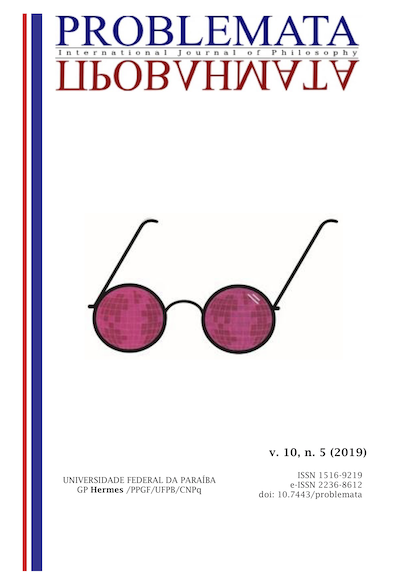O FASCISMO E AS MASSAS:
UMA ANÁLISE DA TEORIA FREUDIANA SOBRE O CONTÁGIO DO ÓDIO
DOI:
https://doi.org/10.7443/problemata.v10i5.47439Keywords:
Fascism, Behavior, Individual Being, Collective soulAbstract
The purpose of this article is to address the social phenomenon of fascism and the behavior of individuals in groups from the perspective of the Freud’s theory of mass psychology, a phenomenon that had great influence in some countries in the twentieth century, and its appearance in Italy, which operated as inspiration for Nazism in Germany. This ideology was mainly adopted for its strong nationalist and authoritarian feature as a means that would save from the economic crisis. We will address the distinction between the behavior of the psychic life of the individual and the collective soul in order to understand the main questions that arise in this study of the behavior of the masses, which are: how does the mass influences the individual’s psychic life. What is the modification of the psyche the mass imposes on the individual? According to Freud, as we shall see, the unconscious plays a fundamental role in human actions, and according to Le Bon, the sense of responsibility for the acts of individuals in the mass does not exist, since it feels empowered to yield to the unconscious instincts that controlled as an individual being. Freud maintains that the new aspects present in the individual of the mass are exactly what before, as an individual being, were not exposed and that it attains power in the mass. Another important point of Freud and Le Bon's approach are the aspects of contagion and suggestion present in the mass, important to understand how fascism win supporters to hate speech, contagion that can be understood in the light of Freud’s studies on hypnosis. In this Article shall also be addressed the concepts of libido and identification in order to understand what unites individuals with the mass and its leaders, which are guided by a hypnotist speech, thus, allowing the predominance of an unconscious personality.
Downloads
References
ADORNO, W. T. Teoria freudiana e o padrão da propaganda fascista. In___ Ensaios sobre psicologia social e psicanálise. Tradução Verlaine Freitas. São Paulo: Editora UNESP, 2015.
FREUD, S. Psicologia das massas e análise do Eu e outros textos (1920-1923). Tradução de Paulo César de Souza. – São Paulo: Companhia das Letras, 2011.
ECO, U. O fascismo Eterno. Disponível em:
< http 2019s://deusgarcia.files.wordpress.com/2018/06/eco-o-fascismo-eterno.pdf > Acesso em 09 de agosto de 2019.
LE BON, G. Psicologia das multidões. Disponível em: <https://filosoficabiblioteca.files.wordpress.com/2016/03/le-bon-gustave-psicologia-das-multidc3b5es.pdf> Acesso em 09 de agosto de 2019.
Torcida do Atlético-MG cita Bolsonaro e incentiva assassinato de homossexuais. Jovem Pan, 2018. Disponível em: < https://jovempan.uol.com.br/sem-categoria/torcida-do-atletico-mg-cita-bolsonaro-e-incentiva-assassinato-de-homossexuais.html> Acesso em 09 de agosto de 2019.
Downloads
Published
Issue
Section
License
Authors who publish with this journal agree to the following terms:
- Authors retain copyright and grant the journal right of first publication with the work simultaneously licensed under a Creative Commons Attribution License that allows others to share the work with an acknowledgement of the work's authorship and initial publication in this journal.
- Authors are able to enter into separate, additional contractual arrangements for the non-exclusive distribution of the journal's published version of the work (e.g., post it to an institutional repository or publish it in a book), with an acknowledgement of its initial publication in this journal.
-
- Authors are permitted and encouraged to post their work online (e.g., in institutional repositories or on their website) prior to and during the submission process, as it can lead to productive exchanges, as well as earlier and greater citation of published work (See The Effect of Open Access).





